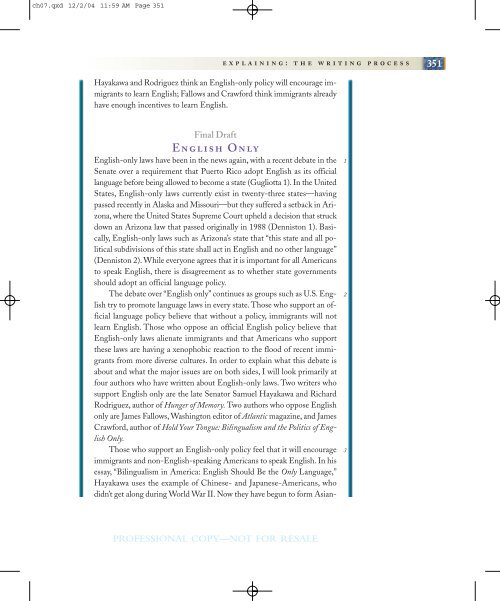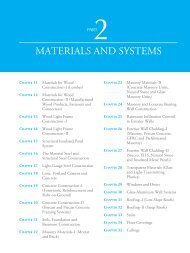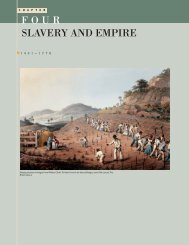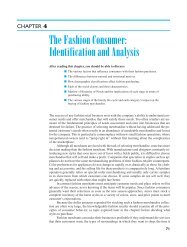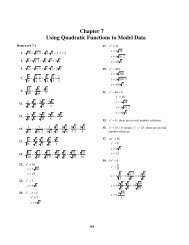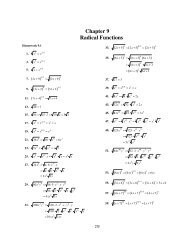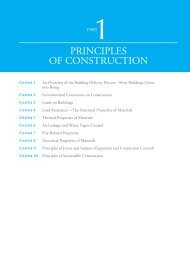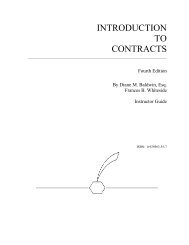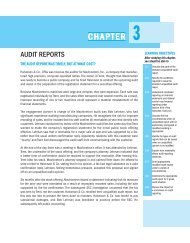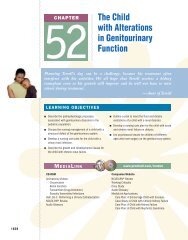A prolific painter of portraits before and after the French Revolution ...
A prolific painter of portraits before and after the French Revolution ...
A prolific painter of portraits before and after the French Revolution ...
You also want an ePaper? Increase the reach of your titles
YUMPU automatically turns print PDFs into web optimized ePapers that Google loves.
English-only laws have been in <strong>the</strong> news again, with a recent debate in <strong>the</strong><br />
Senate over a requirement that Puerto Rico adopt English as its <strong>of</strong>ficial<br />
language <strong>before</strong> being allowed to become a state (Gugliotta 1). In <strong>the</strong> United<br />
States, English-only laws currently exist in twenty-three states—having<br />
passed recently in Alaska <strong>and</strong> Missouri—but <strong>the</strong>y suffered a setback in Arizona,<br />
where <strong>the</strong> United States Supreme Court upheld a decision that struck<br />
down an Arizona law that passed originally in 1988 (Denniston 1). Basically,<br />
English-only laws such as Arizona’s state that “this state <strong>and</strong> all political<br />
subdivisions <strong>of</strong> this state shall act in English <strong>and</strong> no o<strong>the</strong>r language”<br />
(Denniston 2). While everyone agrees that it is important for all Americans<br />
to speak English, <strong>the</strong>re is disagreement as to whe<strong>the</strong>r state governments<br />
should adopt an <strong>of</strong>ficial language policy.<br />
The debate over “English only” continues as groups such as U.S. English<br />
try to promote language laws in every state. Those who support an <strong>of</strong>ficial<br />
language policy believe that without a policy, immigrants will not<br />
learn English. Those who oppose an <strong>of</strong>ficial English policy believe that<br />
English-only laws alienate immigrants <strong>and</strong> that Americans who support<br />
<strong>the</strong>se laws are having a xenophobic reaction to <strong>the</strong> flood <strong>of</strong> recent immigrants<br />
from more diverse cultures. In order to explain what this debate is<br />
about <strong>and</strong> what <strong>the</strong> major issues are on both sides, I will look primarily at<br />
four authors who have written about English-only laws. Two writers who<br />
support English only are <strong>the</strong> late Senator Samuel Hayakawa <strong>and</strong> Richard<br />
Rodriguez, author <strong>of</strong> Hunger <strong>of</strong> Memory. Two authors who oppose English<br />
only are James Fallows, Washington editor <strong>of</strong> Atlantic magazine, <strong>and</strong> James<br />
Crawford, author <strong>of</strong> Hold Your Tongue: Bilingualism <strong>and</strong> <strong>the</strong> Politics <strong>of</strong> English<br />
Only.<br />
Those who support an English-only policy feel that it will encourage<br />
immigrants <strong>and</strong> non-English-speaking Americans to speak English. In his<br />
essay, “Bilingualism in America: English Should Be <strong>the</strong> Only Language,”<br />
Hayakawa uses <strong>the</strong> example <strong>of</strong> Chinese- <strong>and</strong> Japanese-Americans, who<br />
didn’t get along during World War II. Now <strong>the</strong>y have begun to form Asianch07.qxd<br />
12/2/04 11:59 AM Page 351<br />
explaining:<br />
<strong>the</strong> writing process<br />
351<br />
Hayakawa <strong>and</strong> Rodriguez think an English-only policy will encourage immigrants<br />
to learn English; Fallows <strong>and</strong> Crawford think immigrants already<br />
have enough incentives to learn English.<br />
Final Draft<br />
English Only<br />
1<br />
2<br />
3<br />
PROFESSIONAL COPY—NOT FOR RESALE


